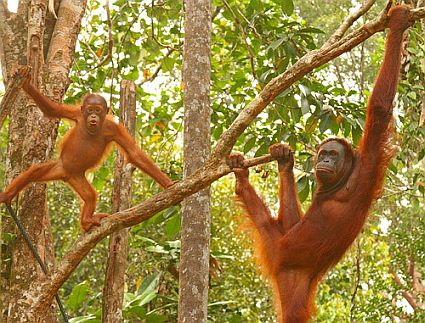
We choose Oil palm plantations instead of orangutans, quick bucks over later losses. Even as their limited habitats are destroyed, they cling precariously to life. From a once-mighty orange army of 300,000 their numbers have dwindled to 25,000 concentrated on the two Indonesian islands of Borneo and Sumatra. Conservationists fear that without action, the orang-utans – one of the four great apes along with gorillas, chimpanzees and bonobos, have just 10 to 15 years left in the wild.
Their only home lies high above the ground in tropical rainforest trees, where Illegal logging, fires and clearances are competing to destroy their habitats. Almost totally dependent on trees, the animals survive on a mostly fruit-based diet supplemented by bark, flowers, leaves and insects. Extremely slow to breed, the inter-birth cycle in orang-utans takes up to eight years, limiting females to three or four offspring during their 45-year life span.
The Tanjung Putting Park, is a 410,000-hectare nature reserve that is home to perhaps 6,000 orang-utans (nobody knows for sure) along with proboscis monkeys, gibbons, macaques and crocodiles. Even its sheltered area has been in filtered by illegal loggers.
Illegal logging and habitat destruction
Incessant human demand and greed is consuming most of the reserved forest areas. Bald patches of cleared jungle can be seen recurrently, guards posted along the river patrol for illegal logging and poaching even as some are conspiring with the illegal loggers. Also valuable forest hardwood, including teak and mahogany is often sold to finance the plantations. The main culprit seems to be clearing land for palm oil plantations.
What are the uses for palm oil?
Well if your bag is filled with cosmetics, probably most have palm oil in them, after all, it is the world’s most popular vegetable oil, surpassing its soybean alternative and used in a tenth of supermarket products, including crisps, biscuits, toothpaste, margarines and make-up. Malaysia and Indonesia, the world’s number one and number two producers for palm oil. Extracted from the fast-growing oil palm tree it is resulting in the clearing of vast tracts of tropical rain forest areas. Many have also hailed palm-oil diesel as a safe, renewable alternative to petroleum, but such claims have been undermined by a series of studies. Therefore, I believe this bio-fuel in no way helps to offset your carbon footprint, rather just makes it deeper.
The worldwide demand for palmoil is the greatest threat for the remaining orangutans. Palm oil from the remaining rainforests will effect our lives. We cannot allow it!
Even as conservationists try to supplement the food of the orangutans with bananas and milk, they realize that the only way for them to survive in the wild is by protecting their habitats where they can themselves forge for food. So what can you do about the situation? Probably start by not using palm oil!
Image credit: Scott Crowder/ Flicker
Source: The Independent


